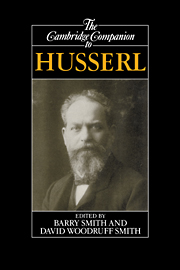4 - Knowledge
Published online by Cambridge University Press: 28 May 2006
Summary
ANALYSIS OF KNOWING AS CENTRAL TO HUSSERL'S WORK
Clarification of the nature of knowledge (Erkenntnis) is the primary aim of Husserl's philosophical work, at least up to 1913, when he completed Section Four of Ideas I. In his earliest work he was concerned with the analysis of specifically mathematical knowledge, but he soon realized that the main issues in that area had to do with knowledge in general rather than with mathematical knowledge as such. Thus, his first major work, the Logical Investigations (1900- 1901), became an analysis of the nature of knowledge in general and of the conditions of its possibility. Volume II is titled “Investigations in the Phenomenology and Theory of Knowledge” and culminates in the “Sixth Investigation” which is an elaborate statement on what, exactly, knowledge is. That investigation is titled, “Elements of a Phenomenological Clarification of Knowledge,” and indicates in its opening words that such clarification has been the aim of the “Investigations” all along. The Sixth Investigation is the counterpart of Section Four in the later Ideas I (1913), where, with some novel elements and emphases, he once again gives an account of the nature of knowledge (see note 2 of §145), but now as a phenomenology of reason or noetic phenomenology.
- Type
- Chapter
- Information
- The Cambridge Companion to Husserl , pp. 138 - 167Publisher: Cambridge University PressPrint publication year: 1995
- 8
- Cited by



